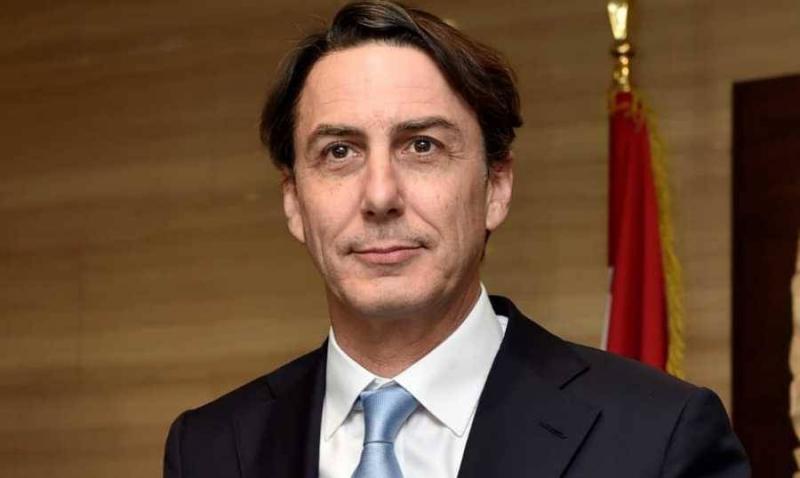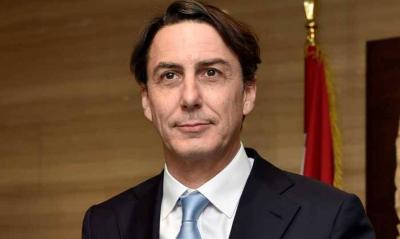Communications are intensifying on various fronts in search of a breakthrough in the presidential crisis that would lead to an effective session for electing a president of the republic, devoid of political theatrics. In this context, the five-member committee is attempting to bring the National Moderation Bloc to the forefront and to move through it, considering that it has communicated with all parties and is not classified within either of the two axes.
This led to a meeting between a delegation from the bloc and the Egyptian ambassador, Alaa Moussa, to agree on a framework for action and the possibility of calling for a consultative session where the bloc could act as a lever to resolve the impasses. For this purpose, a member of the bloc, MP Walid Baaarini, is visiting the Speaker of the House, Nabih Berri, to clarify his position on the next step and to update him on the bloc's communications after reactivating its initiative.
Some view that the efforts being made by the moderation bloc face obstacles that are difficult to resolve in light of regional crises. This is where former leader of the Progressive Socialist Party, Walid Jumblatt, who held talks in Qatar, warned that the war in the region is still in its early stages and may continue beyond the end of the year, thus emphasizing the necessity of electing a president through dialogue and consensus.
An informed source told "Al-Anbaa" that Jumblatt is concerned about the continuity of the situation amid a state of unsatisfactory stagnation, which is why the Democratic Gathering (Jumblatt's parliamentary bloc) has shown notable flexibility regarding the nomination of former Minister Sleiman Frangieh, the candidate of the (Shiite duo). This position differs from where the (Progressive) party stood at the beginning of the presidential vacuum, as Jumblatt expressed readiness to support Frangieh if a national umbrella for this candidacy is provided.
The source added that the Democratic Gathering would support the (Shiite duo) candidate if the latter could woo the (Free Patriotic Movement) to vote alongside them, thus gaining the endorsement of all sects and a majority of political blocs. The source further indicated that Jumblatt's bloc would not vote for a candidate rejected by Christian leaders, as it believes he should have the backing of either the (Lebanese Forces) or the (Free Patriotic Movement). Otherwise, Jumblatt would not align with either of the two factions.
These flexible positions from multiple parties, according to the source, intersect with diplomatic reports indicating that Washington has begun considering Frangieh's candidacy as a serious proposal, within a comprehensive package aimed at resolving the long-standing presidential vacancy that has paralyzed all state institutions, particularly since the American side has made significant progress in directly engaging with the (Shiite duo) through the Speaker or indirectly to resolve many stalled issues, including the border matter.
However, a careful political reading of the source's statements is sufficient to revert matters to square one regarding the presidency, with expectations that the (Lebanese Forces) and the (Free Patriotic Movement) will refuse to support Frangieh's nomination, reminiscent of the previous stance against the American-Syrian understanding in 1988. Back then, the Lebanese Army Commander General Michel Aoun and the leader of the (Lebanese Forces) Samir Geagea met in the Ministry of National Defense in Yarzeh on September 18 after a breakup that lasted since September 29, 1986. They agreed to reject what was known at that time as the Murphy Agreement (named after the U.S. envoy to the Middle East Richard Murphy) – Assad (the Syrian President Hafez al-Assad) to nominate Mikhael Daher from Akkar for the presidency, which took place just days before the end of President Amin Gemayel’s constitutional term.
This rejection led to consequences that prolonged the presidential vacuum until November 1989, when President Rene Mouawad was elected at the Qlayaat airbase in northern Lebanon, after Lebanese deputies signed the well-known national reconciliation document known as the Taif Agreement.
In any case, matters oscillate between optimism and a push towards it from the pillars of the quintet, alongside a cautionary internal optimism stemming from the Lebanese experiences with the outcomes of such matters. There have been voices within Lebanon warning against linking Hezbollah and consequently the duo to the Lebanese presidential election with the war in Gaza, while an internal opposition team hopes to leverage the war's outcomes, believing it would undermine the party’s leverage in future presidential negotiations.
Meanwhile, European and Arab external movements towards Lebanon are intensifying. French envoy Jean-Yves Le Drian is set to visit Beirut next week to push for countdown steps towards the presidential elections, alongside the recent statement from the quintet.
Western diplomatic sources revealed to "Al-Anbaa" that Le Drian coordinated his visit with U.S. envoy Amos Hochstein regarding the presidential election and the ceasefire on the Lebanese-Israeli border, under a formula that Hochstein has worked out with both the Lebanese side via Speaker Nabih Berri and the Israeli government.
Le Drian will meet with Lebanese parties, including officials and heads of parties and parliamentary blocs. These meetings will focus on discussing positions rather than probing sentiments, as was previously done. A former active governmental source warned "Al-Anbaa" of potential clashes between Le Drian and some Lebanese politicians, as occurred in his recent meeting with National Free Movement leader MP Gibran Bassil, when the latter refused to approve the extension of Army Commander General Joseph Aoun’s term, leading Le Drian to leave Bassil’s residence less than 10 minutes after their meeting began. The source emphasized the need for everyone to exercise caution in presenting their proposals to reach positive outcomes.




